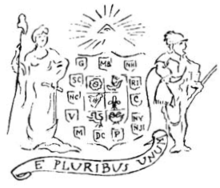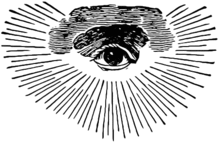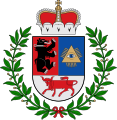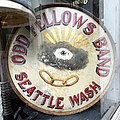Eye of Providence

The Eye of Providence or All-Seeing Eye is a symbol depicting an eye, often enclosed in a triangle and surrounded by rays of light or a halo, intended to represent Providence, as the eye watches over the workers of mankind.[1][2][3] A well-known example of the Eye of Providence appears on the reverse of the Great Seal of the United States, which is depicted on the United States one-dollar bill.
Use by governments and confederations
United States

In 1782, the Eye of Providence was adopted as part of the symbolism featured on the reverse side of the Great Seal of the United States. It was first proposed as an element of the Great Seal by the first of three design committees in 1776, and it is thought to be the suggestion of the artistic consultant Pierre Eugene du Simitiere.[4] At the time, it was a conventional symbol for God’s benevolent oversight.[5]
In his original proposal to the committee, du Simitiere placed the Eye over shields so as to symbolize each of the original thirteen states of the Union. On the version of the seal that would eventually be approved, the Eye is positioned above an unfinished pyramid of thirteen steps (again symbolizing the original States, but also incorporating the nation's potential for future growth). Such symbolism is explained through the motto that appears above the Eye, annuit cœptis, meaning "He approves [our] undertakings" (or "has approved").[6][7]
Perhaps due to its use in the design of the Great Seal, the Eye has made its way into other American seals and logos, such as, for example:
- The Seal of Colorado
- The city seal of Kenosha, Wisconsin
- DARPA's Information Awareness Office
U.S. currency
The Eye of Providence has been used among various forms of currency throughout U.S. history, including:
- the United States one-dollar bill, as part of the Great Seal
- the Vermont Copper
- Nova Constellatio patterns of 1783[8]
- Nova Constellatio coppers of 1783 and 1785[9]
- some Immune Columbia issues[10]
Lithuania
The Eye of Providence appears on several Lithuanian coats of arms, including those of:
Other countries


The Eye of Providence appears on the coats of arms of Victoria, Canada; Brasłaŭ, Belarus; Neman, Russia; Radekhiv, Ukraine; and Radzymin and Wilamowice, Poland. The Eye was also part of the flag and coat of arms adopted by the Confederation of the Equator, a short-lived 1824 secessionist revolt in the northeastern provinces of Brazil. In the United Kingdom, the symbol was part of the Guards Division insignia, created in 1915.
In Estonia, the 50 krooni note shows the Eye as part of a depiction of the pipe organ of the Käina church. Likewise, the (old) 500 Ukrainian hryvnia note also depicts the Eye.
The Eye was included in the original publication of France's Declaration of the Rights of Man and of the Citizen,[5] which also borrows iconography from the Ten Commandments. Similarly, the symbol is featured on the front page of the Constitution of Serbia from 1835. In Nigeria, the eye symbol is part of the Nigeria Customs Service logo.
Freemasonry

Today, the Eye of Providence is often associated with Freemasonry, first appearing as part of the standard Freemason iconography in 1797 with the publication of Thomas Smith Webb's The Freemason's Monitor.[11][12]
In this use, the Eye, representing the all-seeing eye of God, serves as a reminder that humanity's thoughts and deeds are always observed by God—who is referred to in Masonry as the Great Architect of the Universe. Typically, the Masonic Eye of Providence has a semicircular glory below it, and is sometimes enclosed by a triangle.
Popular among conspiracy theorists is the claim that the Eye of Providence shown atop an unfinished pyramid on the Great Seal of the United States indicates the influence of Freemasonry in the founding of the United States. However, common Masonic use of the Eye dates to 14 years after the creation of the Great Seal. Furthermore, the only Mason among the members of the various design committees for the Great Seal was Benjamin Franklin, whose ideas for the seal were not adopted. Likewise, various Masonic organizations have explicitly denied any connection to the creation of the Seal.[13][14]
Use in religion
Christianity

The association of an eye with the concept of Divine Providence is found in Christianity. In late Renaissance European iconography, the Eye, surrounded by a triangle, was an explicit symbol of the Christian Holy Trinity.[15] The Eye of Providence was later painted above an image of three faces in Pontormo's 1525 Supper at Emmaus.[5] Seventeenth-century depictions of the Eye sometimes show it surrounded by clouds or sunbursts.[16] The Eye of God in a triangle is still used in church architecture and Christian art to symbolize the Trinity and God's omnipresence and divine providence.
The Eye of Providence is notably featured on the following buildings of the Roman Catholic Church, Eastern Orthodoxy, and The Church of Jesus Christ of Latter-day Saints:
- The Mannheim Jesuit Church in Mannheim, Germany
- The Kazan Cathedral in Saint Petersburg, Russia
- The Shio-Mgvime Monastery in Mtskheta, Georgia
- The Salt Lake Temple in Salt Lake City, Utah
University/college insignia and logos of organisations
Several universities and college fraternities use the Eye of Providence in their coats of arms, seals, or badges, notably:
- Delta Tau Delta based in Fishers, Indiana
- Phi Kappa Psi based in Indianapolis, Indiana
- Phi Delta Theta based in Oxford, Ohio
- Delta Kappa Epsilon based in Ann Arbor, Michigan
- Princeton Theological Seminary in Princeton, New Jersey
- The University of Chile in Santiago, Chile
- The University of Mississippi in Oxford, Mississippi
Gallery
-
Alchemical woodcut, which reads quo modo deum (lit. 'This is the way of God'), with the All-Seeing Eye floating in the sky
-
Original seal of the DARPA Information Awareness Office
-
All-Seeing Eye on the pedestal decorations of Alexander Column
-
All-Seeing Eye on the top of the Declaration of Human Rights (1789) from the French Revolution
-
All-Seeing Eye on the gate of Aachen Cathedral
-
Eye of Providence depicted in a stained glass window in the St. Francis of Assisi Catholic Church in Fifield, Wisconsin
-
God Eye in West Ukraine (Ukrainian Carpathians) near Mykulychyn village. The inscription on the stone, written in an old Ukrainian dialect, translates to "All will pass but God's eye does not pass you."
-
The Eye of Providence in a Jewish cemetery in Kamienna Góra
-
Eye of Providence in the canting arms of the Jauch family (motto: "Lord thou shalt guide me with thy counsel", Psalm 73:24)
-
All Seeing Eye cross
-
The Eye of Providence depicted on the "Vistina – La Verite", a medallion issued by the Masonic Lodge in Skopje, North Macedonia
-
The Eye of Providence in Masonic Temple of Santa Cruz de Tenerife, Spain
-
Odd Fellows Temple (1908) drum on Capitol Hill in Seattle, Washington
-
Eye of Providence from the reverse of the Great Seal of the United States, as seen on the U.S. $1 bill.
-
In the tall tale of Baron Munchausen, the liar came across the eyed pyramid in the sky. Illustration drawn by Gustav Doré in 1862.
See also
References
- ^ "The eye as a Christian symbol". catholic-saints.com. Retrieved October 4, 2024.
- ^ "The Eye as a religious symbol". Religiousfacts.com. Archived from the original on April 2, 2015. Retrieved December 9, 2009.
- ^ "Freemasonry and the All-seeing Eye". Grand Lodge of British Columbia and Yukon.
- ^ Bureau of Public Affairs. July 2003. "The Great Seal of the United States." Washington: U.S. Department of State Archive; See also "Great Seal." Bureau of Public Affairs. 2002. Both retrieved 6 June 2020.
- ^ a b c Wilson, Matthew (November 13, 2020). "The Eye of Providence: The symbol with a secret meaning?". BBC.
- ^ "Annuit Coeptis - History of Motto Above Great Seal's Eye of Providence". greatseal.com. Retrieved October 4, 2024.
- ^ "Thirteen - America's Number On the Great Seal of the United States". greatseal.com. Retrieved October 4, 2024.
- ^ Spurrier, Lianna. 7 November 2018. "Lost & Found: The Nova Constellatio Set" (video, 5:40). YouTube.
- ^ "Constellatio Nova Coppers - Introduction". coins.nd.edu. Retrieved August 9, 2019.
- ^ "Immunis Columbia Copper (backdated) 1787: Introduction". coins.nd.edu. Retrieved August 9, 2019.
- ^ Morris, S. Brent. 13 January 2010. The Eye in the Pyramid." Short Talk Bulletin. Silver Spring, MD: Masonic Service Association. Retrieved 6 June 2020.
- ^ Webb, Thomas Smith. [1791] 1821. The Freemasons Monitor or Illustrations of Masonry. Salem, MA: Cushing and Appleton. p. 66.
- ^ "Anti-masonry Frequently Asked Questions". Grand Lodge of British Columbia and Yukon.
- ^ Barrett, David. "The "Masonic" One Dollar: Fact or Fiction?". Pietre-Stones Review of Freemasonry.
- ^ David Baker (February 21, 2020). "Optical connections: The all-seeing eye". opticianonline.net.
- ^ Potts, Albert M. (1982). The World's Eye. University Press of Kentucky. pp. 68–78. ISBN 978-0-8131-3130-6.
External links
 Media related to Eye of Providence at Wikimedia Commons
Media related to Eye of Providence at Wikimedia Commons






















